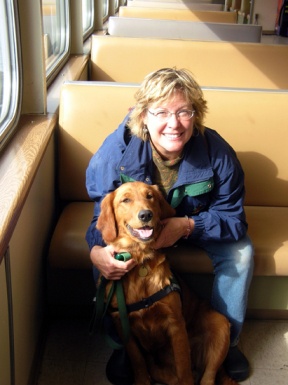Well trained dogs can be a source of help and comfort for those living with a disability.
Summit Assistance Dogs, a nonprofit organization based in Anacortes, Washington, provides highly skilled mobility, hearing and therapy dogs for people with disabilities. The group is hosting a “Pawsitively Inspirational” presentation about the work of the organization.
On Tuesday, March 25 from 6:30-7:30 at Lopez Center a demo dog will educate the public on the mission of Summit. Also at the presentation will be Lopez School’s therapy dog, Daisy.
Daisy is a Golden Retriever trained at Summit who has been helping Lopez students since August. Middle and high school special education teacher Vicki Carter had the idea for a therapy dog last year after an eye-opening experience with her own dog, Barney. When Barney became terminally ill, she asked the school if she could bring him with her to work, to rest in her office.
“When students came in, I was amazed at the change in kids, both behaviorally and academically. Their whole vibe was calmer and more relaxed. I had kids coming to school more often and reading more,” said Carter. One student who liked to read next to Barney responded so well that he underwent three years of reading growth in three months.
After doing research, Vicki found Summit Assistance, who had an upcoming presentation scheduled on Lopez. She asked if the group would also present at the school, and when they did, “it just all clicked. There really is a connection between therapy dogs and educational performance and mental well being.” The school did a lot of background work before applying for a therapy dog, checking if any of the students had problems with or allergies to dogs.
Since Daisy’s arrival, the results have been what Carter calls “amazing.” Daisy provides social interaction and therapeutic intervention. “Kids read to her, feel calmer around her, and take tests next to her. Daisy has a trainer here on the island and kids help with that too. We also take her for walks.” Every morning Carter and Daisy station themselves in the hall and greet kids when they come in, and it “always puts a smile on their face.”
Daisy, who lives with Carter, may not stay at Lopez School after this year. Daisy is such a special dog that Summit might enroll her in advanced training, making her eligible for placement with someone in a wheelchair. “My job this year has been to provide training for her and socialize her with the students to see if she would be a fit for a therapy dog or go on to be an assistance dog. Of course, we want her to stay.” If Daisy does leave, Carter plans to apply for another therapy dog. Although it’s a brand new program for the school, “we’re convinced. The results have been fantastic.”
Summit was founded in 2000 in response to the overwhelming need for more trained dogs. According to Summit, recent statistics estimate that only one percent of people wishing partnership with a canine helpmate are able to receive one.
Assistance dogs empower people with disabilities to lead lives of greater independence by performing tasks that would otherwise require reliance on a human caregiver. These tasks might include retrieving dropped objects, opening and closing doors, retrieving an emergency telephone, alerting a person who is hard of hearing to sounds, and more.
For more information about Summit, (360) 293-5609, www.summitdogs.org, or info@summitdogs.org. The demonstration at Lopez Center is free.



